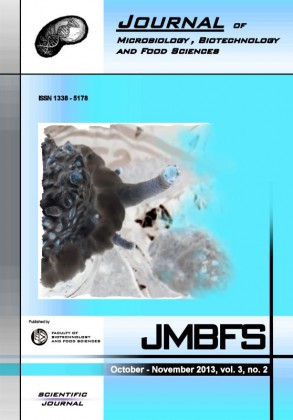POTENTIAL OF Lactococcus lactis subsp. lactis MTCC 3041 AS A BIOPRESERVATIVE
Keywords:
Bacteriocin, Preservative, Lactic acid bacteria, LactococciAbstract
Lactic acid bacteria especially in developing countries can be exploited against frequently occurring spoilage organisms of fresh fruits and vegetables in addition to pathogens. Keeping in views this antagonism imparted by bacteria Lactococci, the present study was taken and effectiveness of bacteriocin of Lactococci was also studied in preservatives and enzymes. Lactic acid bacteria Lactococcus lactis subs. Lactis MTCC 3041 was used as bacteriocin producer strain. Isolation of most frequently occurring spoilage organisms from spoiled Mango and Kinnow was done by microbiological procedures and were identified by microscopic studies as Isolate 1 and Isolate 2. It has limited use in processed salted food as no zone of inhibition was observed at and above 5% NaCl (w/v).0.3% (w/v) is the minimum concentration of KMS that provides stress to the microorganism for the production of bacteriocin. It is not suitable for food having sodium benzoate as preservative as with increase in concentration growth of Lactococcus lactis decreases. Presence of bacteriocin hinders the growth of the isolate 1 as fresh weight of the mycelium in test sample is 7.09% less than the control. Being non-pathogenic this organism can be safely used against spoilage organisms in addition to food borne pathogens.Downloads
Download data is not yet available.
Downloads
Published
2013-10-01
How to Cite
Sharma, N., Garcha, S., & Singh, S. (2013). POTENTIAL OF Lactococcus lactis subsp. lactis MTCC 3041 AS A BIOPRESERVATIVE. Journal of Microbiology, Biotechnology and Food Sciences, 3(2), 168–171. Retrieved from https://office2.jmbfs.org/index.php/JMBFS/article/view/7062
Issue
Section
Microbiology
License
Copyright (c) 2013 Neha Sharma, Seema Garcha, Sunity Singh

This work is licensed under a Creative Commons Attribution 4.0 International License.
All papers published in the Journal of Microbiology, Biotechnology and Food Sciences are published under a CC-BY licence (CC-BY 4.0). Published materials can be shared (copy and redistribute the material in any medium or format) and adapted (remix, transform, and build upon the material for any purpose, even commercially) with specifying the author(s).

